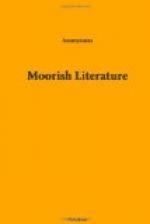Not only Zaida’s eyes are wet,
For him her soul shall ne’er forget;
But many a heart in equal share
The sorrow of that lady bare.
Yes, all who drink the water sweet
Where Genil’s stream and Darro meet,
All of bold Albaicins’s line,
Who mid Alhambra’s princes shine—
The ladies mourn the warrior high,
Mirror of love and courtesy;
The brave lament him, as their peer;
The princes, as their comrade dear;
The poor deplore, with hearts that bleed,
Their shelter in the time of need.
Sadly we march along the crowded street,
While trumpets hoarsely blare and drums
tempestuous beat.
THE SHIP OF ZARA
It was the Moorish maiden, the fairest
of the fair,
Whose name amid the Moorish knights was
worshipped everywhere.
And she was wise and modest, as her race
has ever been,
And in Alhambra’s palace courts
she waited on the Queen,
A daughter of Hamete—of royal
line was he,
And held the mighty castle of Baja’s
town in fee.
Now sad and mournful all the day the maiden
weeping sat,
And her captive heart was thinking still
of the distant caliphat,
Which in the stubborn straits of war had
passed from Moslem reign,
And now was the dominion of King Ferdinand
of Spain.
She thought upon the dreary siege in Baja’s
desert vale
When the fight was long and the food of
beasts and men began to fail,
And her wretched father, forced to yield,
gave up his castle hold,
For falling were the towers, falling fast
his warriors bold.
And Zara, lovely Zara, did he give into
the care
Of the noble Countess Palma, who loved
the maiden fair.
And the countess had to Baja come when
Queen Isabella came,
The lovely vega of the town to waste with
sword and flame.
And the countess asked of Zara if she
were skilled in aught,
The needle, or the ’broidery frame,
to Christian damsels taught.
And how she made the hours go by when,
on Guadalquivir’s strand,
She sat in the Alhambra, a princess of
the land.
And, while her eyes were full of tears,
the Moorish maid replied:
“’Twas I the silver tinsel
fixed on garments duly dyed;
’Twas I who with deft fingers with
gold lace overlaid
The dazzling robes of flowery tint of
velvet and brocade.
And sometimes would I take my lute and
play for dancers there;
And sometimes trust my own weak voice
in some romantic air;
But now, this moment, I retain but one,
one mournful art—
To weep, to mourn the banishment that
ever grieves my heart.
And since ’tis thou alone whose
bread, whose roof my life didst save,
I weep the bitterest tears of all because
I am a slave!
Yet wouldst thou deign, O lady dear, to
make more light to me
The hours I pass beneath thy roof, in
dark captivity,—
I bid thee build for me, if thou approve




